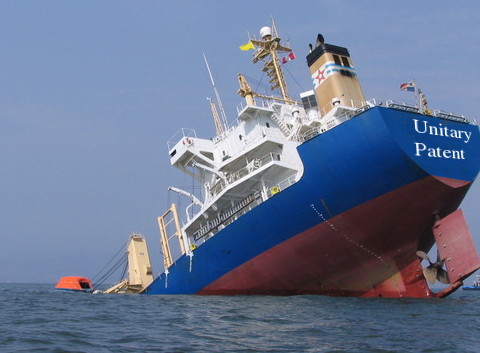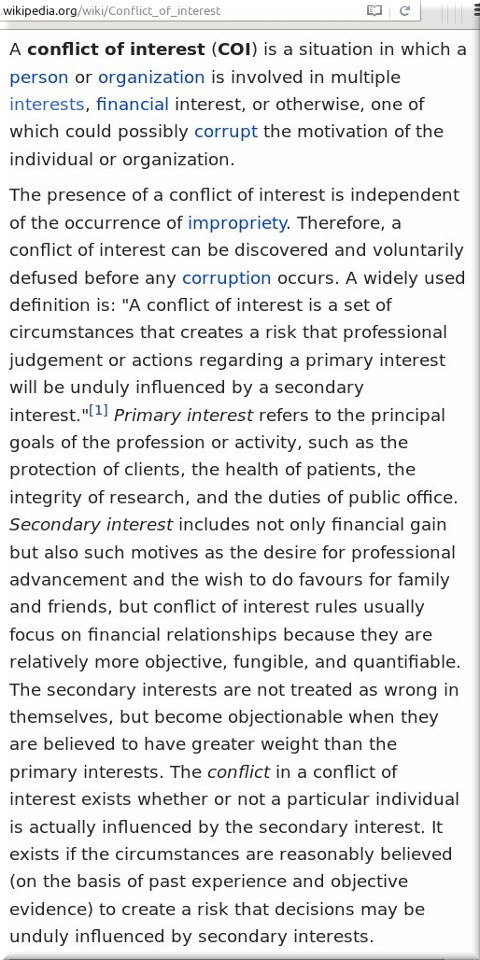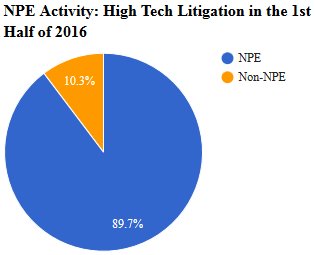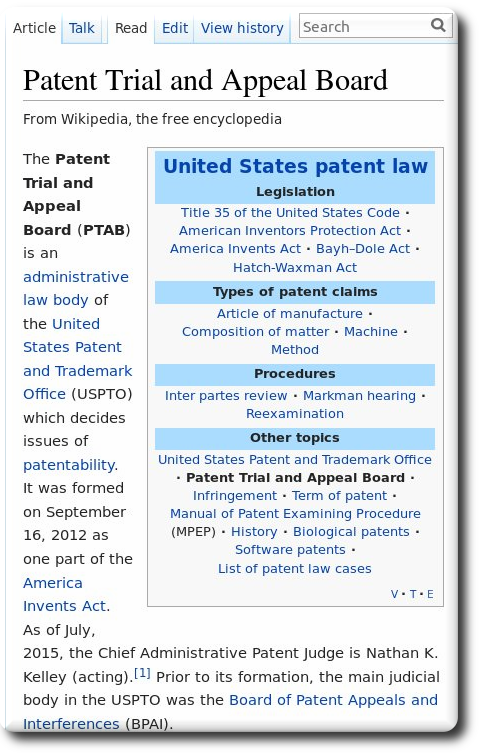07.09.16
Posted in Europe, Patents at 11:40 pm by Dr. Roy Schestowitz
English/Original
Article as ODF
Publicado en Europa, Patentes a las 6:28 pm por el Dr. Roy Schestowitz

Sumario: El conectado con la EPO IAM, expresa algunos puntos de vista pesimistas acerca del régimen de la Patente Unitaria, la que fué construída secretamente por (y para) firmas de abogados de patentes
La EPO puede haber hecho un amigo (o amigos) en IAM, pero Battistelli no siempre consigue lo que quiere (incluse despues de financiar un evento pro-UPC organizado por IAM con fondos de la firma de Relaciónes Públicas de la EPO). “La UPC,” algunos de adentro notaron, es definitivamente “no por la DG3″ (la que Battistelli está aplástando ahora mismo) y temprano hoy (incluso en Domingo!) el editor en jefe de IAMpublicó “Sería malo políticamente y moralmente indefensible ignorar el voto Brexit y continuar arando por la UPC,” haciéndo eco de lo que hemos venido diciéndo la semana pasada. Es realístament, pesimista, o un despertante sorob de la realidad no-Kool-Aid para IAM, un abogador por la UPC por largo tiémpo? He aquí la parte de esperar dos años y medio antes de que algo pase: “Probablemente, la mayor víctima IP del voto Brexit es la propuesta de tribunal de patentes unificado y el régimen de patente unitaria de la UE. Hasta el Reino Unido deja a la UE es necesaria su ratificación para que el sistema viene a ser, de manera tan realista que probablemente significa un mínimo de dos años y medio de retraso desde aquí. Teniendo en cuenta todo el tiempo y el dinero que se ha invertido en la preparación de lo que se pensaba que era su introducción inminente, eso es un gran golpe”.
“Talvez la democracia es tratada por los círculos de patentes de la misma manera que las autoridades de la UE y el gobierno del Reino Unido lo hacen.”
Acerca del esfuérzo para esquivar las barreras del Equipo UPC (como los llamados equipos ‘expertos’), he aquí lo IAM dice: “Tal vez en parte debido a la inversión, en la última semana se han realizado varias sugerencias (aquí y aquí, por ejemplo) que puede haber formas de evitar el voto Brexit con el fin de obtener que la UPC se ejecute en cualquier caso. Creo que sería un error terrible. [...] La UPC ya tiene sus críticos. Ellos consideran que es el resultado de un hecho a puerta cerrada, diseñado para beneficiar a nadie más que a las grandes corporaciones y los abogados de patentes. Eso puede ser un punto de vista totalmente equivocado, pero una manera de reforzarla y darle más tracción es ignorar las implicaciones de la votación Brexit y de inventar una forma de que el Reino Unido para participar en la UPC”.
IAM no está exactamente feliz con la situación. Las palabras con las que su éditor cierra son: “El pueblo ha hablado, los bastardos.” Muestra de hecho como considera a la gente que sería perjudicada si ellos y Battistelli se hubieran salido con la suya.
Eso muestra también cuán profesionales son. Talvez la democracia es tratada por los círculos de patentes de la misma manera que las autoridades de la UE y el gobierno del Reino Unido lo hacen. Los ¨hijos de putas¨… porque las ofertas a puertas cerradas de los abogados de patentes (complementadas por sesiones fotográficas de Battistelli con sus directivos y políticos), aparentemente debe instruir a los funcionarios elegidos y dirigir toda la política europea de patentes en una sola vez (contra la voluntad de la gente, para los abogados , que se beneficiarían aún más de la UPC si alguna vez se convirtie en una realidad). El editor en jefe de IAM demuestra que el único hijo de puta es él.
Permalink
 Send this to a friend
Send this to a friend
Posted in Europe, Patents at 9:23 am by Dr. Roy Schestowitz

Summary: Continuing a tradition of secrecy and dodgy negotiations among prospective beneficiaries, the UPC gets debated in Munich by Battistelli and Team UPC (mostly patent law firms), yielding nothing but lies and no meaningful press coverage
LAST month and earlier this month we published about half a dozen articles about the collapse of the UPC post-Brexit (see the EPO Wiki for details). It is a real problem for the UPC and this problem has become increasingly accepted even among law firms. For instance, citing Henschel’s article which we mentioned the other day, Benjamin Henrion says [1, 2] that “EU Patent Law will be Germanized without the UK “UPC judge were being accepted till 4 July, but UK judge applicants may now be excluded”” (Team UPC advertised jobs that did not exist and will probably never exist, which says a lot about Team UPC and its utter lack of ethics).
Henrion noted that “the UPC has too many problems.” Other than the problem that the UPC is an attack on democracy itself, there are technical problems with implementation now, especially due to Brexit. This was foreseen by many UPC critics other than Henrion and even the EPO admitted this last month. “Brexit Threatens Legal Uncertainty, Higher Costs For Trademarks, Lawyers Say,” according to IP Watch, but asking lawyers about costs is like asking weapons manufacturers about war and peace (this article is behind a paywall by the way). There are a couple of new articles about the EPO right now, but both are in German [1, 2] (translations would be desirable) and the latter is about Brexit. In many ways the UPC is dead, but Battistelli will try to save this ‘baby’ of his. The latest lies from the EPO (warning: epo.org link, linked to from the EPO’s Twitter account) say that there is “strong support for Unitary Patent package,” but as Henrion correctly told them, “when you ask the patent community, that’s like preaching your own church!” (they have only asked Team UPC behind closed doors)
“Other than the problem that the UPC is an attack on democracy itself, there are technical problems with implementation now, especially due to Brexit.”The UPC certainly enjoys support from the self-serving collusion that created it in the first place or at least came up with the plan. Why is it that epo.org basically became a Battistelli propaganda site rather than something scientific? What will companies think? Small companies all across Europe do not like the UPC. Does the EPO care about them at all? Based on this article from Team UPC, Margot Fröhlinger said that none of the available users and companies expressed reticence to continue with unitary patent package. “Whatever they decide,” to quote directly, “the UPC will go ahead. The baseline of this conference could easily have been: where there is will, there is a way.”
But whose will? Team UPC is a bunch of predators, they don’t represent the interests of Europe. Max Brunner (Ministry of Justice – France) is quoted as saying: “The project is good for business. Therefore we have to carry on.”
But the “UPC is harmful,” noted Henrion. SMEs in Europe speak out against it, having caught up with the facts. Team UPC is basically, yet again, misrepresenting Europe and European businesses. Glyn Moody said that the UPC “good for business means bad for the public here: more monopolies, more price-gouging” (at Europeans’ expense).
Moreno, another UPC critic, quoted Kluwer Patent Blog (part of or a wing of Team UPC) as saying “The UK now has to take certain political decisions. Whatever they decide, the UPC will go ahead” (sounds rather vain and assertive).
Watch who promoted this “Munich Conference” and the Kluwer Patent Blog post. And over at Patent WatchTroll’s blog there’s a Bird & Bird column about “Brexit Implications” (Kluwer Patent Blog is connected to Bird & Bird, which is a core part of Team UPC). Proponents of software patents in Europe like Bastian Best go further by promoting this London seminar and saying: “This could be an interesting seminar “Patent Protection for Software-Related Inventions in Europe & USA”” (in other word, promotion of software patents in spite of the EPC).
“In the case of UPC, as one might expect, it’s a bunch of patent law firms that write ‘the laws’ behind closed doors (no transcripts published) and then ask politicians to ratify or rubberstamp these.”Perhaps the interesting thing will be the composition of attendants at this London seminar. Judging by this tweet posted several days ago (“Post #Brexit #UPC conference at #EPO in #Munich tomorrow http://bit.ly/29y0AAT @EIPLegal’s Rob Lundie Smith attending – look for updates”), Battistelli too was there (“#UP #UPC conference update – #Battistelli provides personal view of #brexit on #UPC – either UK ratifies or UPC delay until UK leaves EU”). Well, Battistelli will have left by then (it can take 2.5 years) and the EPO is currently in a state of crisis (of Battistelli’s own making). The UPC as it was envisioned is dead/dying, but UPC fantasies persist and its creators carry on as if nothing happened (“#UP #UPC Conference: Dr Carsten Zulch: technically qualified judges means bifurcation under UPC only sensible in limited circumstances…”)
“EU laws [are] written by large corps,” Henrion noted, “wonder why people vote for Brexit. Especially when spectrum could be freed instead.”
“When there are no written transcripts of what Member of European Parliament says in committee,” he added, “don’t be surprised people vote for #brexit [...] 15 years ago I requested written transcripts of the discussions in committees of the European Parliament, we are still nowhere” (source)
In the case of UPC, as one might expect, it’s a bunch of patent law firms that write ‘the laws’ behind closed doors (no transcripts published) and then ask politicians to ratify or rubberstamp these. Remember that the Chair UPC select committee is part of the collusion to override law in Europe and this tweet from the conference said “#UP #UPC Conference: Chair UPC select committee – UK could still ratify and post Brexit politicians may or may not find way to keep UK in…” (all speculative).
“Given length of time Brexit could take, this seems an increasingly plausible scenario,” MIP wrote about it.
“We saw the same lack of coverage surrounding the TTIP and TPP in past years; this relied on secrecy and at times on collusion.”“No UPC critics are speaking there,” Henrion noted, linking to this page. This conspiracy of self-enrichment by patent lawyers and their big clients requires that public stay sout, unaware and totally uninvolved. These people are just trying to ram UPC down our politicians’ throats and the more the public knows about it, the worse it will get for Team UPC. “UK preparations for #UPC ratification are finished,” wrote Patently German. “Ratification, however, will be decision of the new PM expected to take office in Sept” (they have much more pressing issues to deal with other than UPC).
As usual, all these secretive meetings were not covered by the media. There was a bunch of lies about it in the EPO’s site and Team UPC blogs. Battistelli, at the expense of the EPO, is buying 'articles' in European 'media', sometimes ‘articles’ or puff pieces in favour of the UPC (some of his ‘media partners’ did this last year and this year). What a disgrace this is. We saw the same lack of coverage surrounding the TTIP and TPP in past years; this relied on secrecy and at times on collusion. █
Permalink
 Send this to a friend
Send this to a friend
Posted in America, Deception, Patents at 8:29 am by Dr. Roy Schestowitz
The profit motive poisons everything; impedes peace and calm, distorts facts and reality

Summary: A critical breakdown of recent articles regarding software patents, patent courts (primarily in the US), and what patent law firms are trying to tell us in order to improve sales (of their services)
PATENT systems like the USPTO and EPO make a lot of sense when granted patents are assigned/merited based on innovation and incentive to create. Several domains demonstrated need for patents and we are not disputing patents in general. Software patents, on the other hand, are neither desirable nor needed, as software developers worldwide can attest to (their work is copyrighted at zero cost and without hassle, protecting against plagiarism).
James Nurton, writing about CJEU right now, says that patent licensing deals stand even “if the patent is revoked or found not to be infringed,” which is of course outright ridiculous. When and if patents are asserted and become a cashflow regardless of their (in)validity, how are people expected to respect this system? Moreover, what happens when the plaintiff or the licensor is a patent troll that produces nothing at all? What happens to the premise of “promoting innovation”? Patent trolling is, in some sense, protectionism warped into racketeering and this does nothing but create uncertainty, which in turn depresses investment and reduces innovation.
“Patent trolling is, in some sense, protectionism warped into racketeering and this does nothing but create uncertainty, which in turn depresses investment and reduces innovation.”Tackling the issue of software patents, recall the Enfish case and see some of the latest articles about it [1, 2]. The latter asks, “Are ‘Improvements’ Key to Subject Matter Eligibility for Software Patents?” The notion of “improvement” is so vague that this question is rather meaningless. Improvement over what and in what terms? Performance? Accuracy?
Now consider also the Rapid Litigation case, which we wrote about the other day. This new article about it reminds us that the Court of Appeals for the Federal Circuit (CAFC) is a big barrier to progress. It’s CAFC that brought software patents to the United States in the first place. Several new articles about the Bascom case at CAFC [1, 2] (by Andrew H. DeVoogd and Matthew A. Karambelas from Mintz, Levin, Cohn, Ferris, Glovsky and Popeo, P.C.), as well as related CAFC articles about Cuozzo case in lawyers’ sites, show much of the same pattern. Patent lawyers pretty much ignore all the cases where software patents get invalidated and only emphasise the exceptions. One site even produced an article titled “Federal Circuit’s Recent Primer on Patent-Eligibility” in which tips are given for tricking CAFC into acceptance of software patents in spite of Alice, just like in this new case. It was rather clear that SCOTUS does not tolerate software patents, but spin sites like IAM would have us believe that “the pendulum is swinging back”. They rely on CAFC in order to discredit SCOTUS, for instance: “Here’s how’s former CAFC Chief Judge Paul Michel describes the Supreme Court’s recent impact on patent law: “Since eBay [it] has been taking authority away from the Federal Circuit. By rejecting every major decision of the CAFC – except Cuozzo and i4i – the Supreme Court has sharply rebuked the Federal Circuit and upended tests that the CAFC had instituted.” That has led, Michel insists, to a strengthening of SCOTUS’s power at the expense of the CAFC and of Congress.”
“The matter of fact is, calls to abolish CAFC have only grown in recently years.”What’s wrong with the Supreme Court having more power than a corrupt court (with track record of misconduct) and a US Congress that’s inherently corrupted because politicians there are funded by large corporations to do their bidding? “SCOTUS weighs in on Halo/Stryker,” says IAM, and “The CAFC rules in Enfish v Microsoft” (a case whose outcome was virtually overturned in another case only days later), perhaps hoping to distract the readers and give the impression that CAFC will ‘save’ patent lawyers from Alice. The matter of fact is, calls to abolish CAFC have only grown in recently years.
Not only patent law firms but also publishers associated with patent law firms peddle the same nonsense. Now that Huawei is making enemies in the West with its bad policies and its patent aggression IAM uses the “swing” buzzword in the headline again (not the swing that in the US is a patent, a method of swinging a swing) to give false hope of litigation rebound now that it’s down considerably. In the words of IAM:
Huawei has accelerated its patent assertion campaign on two fronts over the past week, launching a new complaint against T-Mobile in the United States and a further suit against Samsung in China.
“Huawei’s IP coming-of-age in full swing,” IAM says, but actually, Huawei as a whole is growing (it’s now one of the biggest Android OEMs) and its growing patent stockpile accompanies this growth. Don’t believe IAM and all those patent law firms (like those that fund IAM) when they tell the public that software patents are fine and patent litigation has great prospects. They’re just trying to invite business. It’s called marketing. █
Permalink
 Send this to a friend
Send this to a friend
07.08.16
Posted in America, Deception, Patents at 5:38 am by Dr. Roy Schestowitz

Reference: Conflict of interest
Summary: How media has reported (or spun) some of the latest observations regarding patent lawsuits and software patents in the United States
THE world of ‘IP’-centric media is complex. It’s complex because one must track the payments of many entities in order to better understand the bias (some payments are not direct). IAM, an EPO mouthpiece, is probably one of the worst in that regard, with WatchTroll (Gene Quinn) as a close second. MIP (Managing Intellectual Property) is actually pretty okay, as funds appear to be derived from endorsements (of firms) and subscriptions.
Presenting new evidence of patents as bubbles, MIP says that “IPOS has approved the first loan application using a patent as collateral, and is opening its financing scheme up to other IP rights.” There is also this new article about ASEAN (Asia) and it looks informative enough.
Now, compare that to the latest output from IAM (more like agenda/advocacy, not news). Watch how IAM, which is partly funded by patent trolls, spins litigation decline in the US (reported the other day) as no reason for “Asian companies and governments” to lament or deemphasize patents. “This accords with a widely held perception that recent changes to the US system have made this the toughest environment in which to be a patent plaintiff in recent memory,” says the author, whose colleague later groomed the Microsoft- and Nokia-fed patent troll, MOSAID (renamed Conversant). In this article, IAM doesn’t disclosure Conversant’s payments to IAM . These are the predators (the Microsoft-connected anti-Android proxies) that are paying IAM, so IAM cannot really criticise them (without risk to funding or metaphorically biting the hand that feeds).
“When money changes hands and there is agenda to push (or sell), fact-checking isn’t much of a priority.”Does anyone still take IAM seriously? When money changes hands and there is agenda to push (or sell), fact-checking isn’t much of a priority. Even the world’s largest patent troll is habitually being groomed there.
Speaking of patent trolls, they very often use software patents and even heavily rely on those. Patent Progress, which typically bemoans patent trolls, changed its tune this week and proceeded to yet more criticism of software patents (second time in a week). As Matt Levy put it yesterday:
Alice Helps Another Company Stop a Patent Troll
[...]
It’s critical to have a way to quickly invalidate bad software patents. Alice and 35 U.S.C. § 101 have been invaluable, as the Capstone case attests. But there are critics who complain about Section 101 and its supposed “incoherence.”
For example, David Kappos, the former head of the USPTO, wants to get rid of Section 101 altogether; but then again, he’s not being sued by patent trolls, is he?
David Kappos is also a lobbyist for large corporations now, putting to shame any remnants of USPTO integrity. The author himself (Levy) is funded by some large corporations (through CCIA), which is how we often explain excessive focus on patent trolls rather than on software patents.
For the record, Techrights never has and never will receive money from corporations. Our only ‘agenda’ or ‘bias’ probably pertains to the interests of software developers (being one myself). █
Permalink
 Send this to a friend
Send this to a friend
07.07.16
Posted in America, Patents at 6:39 am by Dr. Roy Schestowitz
So much for ‘protecting’ innovation and creativity (of firms that create nothing)…
 Summary: Technology patents, and notably software patents, continue to be the big hole in companies’ pockets (and the wet dream of patent lawyers)
Summary: Technology patents, and notably software patents, continue to be the big hole in companies’ pockets (and the wet dream of patent lawyers)
AS EXPECTED when we wrote about it yesterday, the Unified Patents figures start making headlines. “Anti Software Patents” wrote “Tech 90% Patent Troll rate” and cited the original which is saying: “Almost 90% of High-Tech litigation continues to be NPE related (Figure 8). Extrapolating 1st half 2016 litigation to the full year would result in 4374 cases (Figure 11). All top 5 most frequent plaintiffs in 2016 were PAEs (Figure 16). PTAB appears to have reached a steady state of filings and cases pending (Figure 18).”
The EFF, in the mean time, starts a new kind of campaign which it compares to Open Access in academia. “When Universities Sell Patents to Trolls,” says the summary, “Publicly Funded Research Is Compromised” (a subject we covered here before in relation to the world’s largest patent troll, which is somewhat of a Microsoft assertion proxy).
Sadly, many patents that are granted to benign (and sometimes taxpayers-funded) entities end up in the hands of patent trolls that are often secretly connected to large corporations which exploit them for loopholes (cannot sue patent trolls in return or allege antitrust violations). █
Permalink
 Send this to a friend
Send this to a friend
Posted in America, Patents at 6:22 am by Dr. Roy Schestowitz

Summary: New Court of Appeals for the Federal Circuit (CAFC) cases/rulings and what the latest developments serve to teach us about CAFC
THE activity of patent litigation is a function of misunderstanding, disagreement, and inability to settle. It is not, however, to be mistaken or conflated with patent activities (cross-licensing for instance). Patent maximalists, especially those who profit from actual litigation (patent lawyers, not necessarily attorneys), conveniently mix the two. It is worth remembering that poor judgment or low-quality patent examination would more likely lead to patent disputes. This is one of several reasons we’re highly concerned about the EPO these days. Looking at the far east, there too litigation activity seems to be on the rise; this week alone Huawei decided to sue with patents [via] once again (China is a growing platform for such litigious activity and hostile atmosphere it entails) and in Korea patent cases boil over to the US courts. Patents were originally introduced not to occupy thousands of courts but for preservation/publication, attribution, and dissemination of knowledge (with accompanying fees or temporary prohibition on imitations). Nowadays, judging by these very recent articles about patents on life [1, 2, 3, 4, 5, 6, 7, 8], patents are made to control who lives and who dies, or who ‘owns’ parts of everyone’s body. This is not OK and it directly relates to software patents if the said patent is looked upon closely. Now there’s also the Rapid Litig. v CellzDirect case [1, 2], patents on exported goods, and other such CAFC cases like Bascom, which relates to software patents. As The National Law Review put it yesterday, “Focusing on Second Step of Alice, Federal Circuit Finds Inventive Concept in Software Patent in BASCOM” (there is more coverage here).
How far can this madness go and when will it be globally realised that software patents never made sense to begin with (it was CAFC that brought these into existence). Matt Levy, writing for Patent Progress yesterday, scoffed at “Bad software patents” when he wrote the article “CAFC Says Configuring an Option per User is Patent-Eligible” (it oughtn’t be). To quote Levy’s explanation of the case and the patent:
Bad software patents apparently still have a few protectors on the Federal Circuit: in its recent decision in Bascom Global Internet Services, Inc. v. AT&T Mobility LLC, a Federal Circuit panel said that a patent for configuring a content filtering option per network user is patent eligible. After making a lot of progress in the wake of Alice Corp. v. CLS Bank, this is a big step backwards.
[...]
This is patent lawyer language, of course, but it’s not too complicated. Basically, there are a few ways of filtering out objectionable websites; this system forces all network requests through a single server which filters out the objectionable websites. Each user has a filtering method(s) associated with her account, and the server uses the associated method(s) for the user making the request. That is the claim. There are no new filtering methods, no implementation details, nothing more specific than what I’ve just described.
Under Alice, it seems pretty clear to me that this shouldn’t be patent eligible. The abstract idea is something like “filtering content through a single access point where the method of filtering content is configured for each user.”
“The Federal Circuit has ruled that the claims of a patent for liver cell treatment were not directed to a patent-ineligible concept, in a decision that provides guidance on how life science innovations can satisfy the Mayo test,” MIP wrote, demonstrating that CAFC not only challenges Alice but also the Mayo test (both at SCOTUS, the US Supreme Court). CAFC also “saves 10k patents by reversing district court decision in Immersion Corp v HTC,” according to this new patent lawyers’ analysis of Immersion Corp v HTC, serving to reinforce the view that CAFC is somewhat of a rogue court which all along was in the pockets of patent lawyers, disinterested in justice itself. █
Permalink
 Send this to a friend
Send this to a friend
Posted in America, Courtroom, Patents at 5:50 am by Dr. Roy Schestowitz

Summary: Another sign that software patents in the United States are a dying breed because closer scrutiny gets applied even outside the courtroom
NOT ALL is doom and gloom. The USPTO, for one thing, is unable to grant software patents like it used to because PTAB keeps invalidating such patents and the US Supreme Court takes the side of PTAB (confer Cuozzo [1, 2, 3]), which unlike USPTO examiners does not strive to maximise the number of granted patents. The National Law Review has a new article about it, titled “Supreme Court Gives Deference to USPTO in Post Grant Proceedings,” and there is even a sponsored ‘article’ about it in IAM this week.
The major news, however, isn’t Cuozzo but the following June report from MIP. It says:
According to the Docket Navigator database, 176 PTAB petitions were filed in June, consisting of 166 inter partes review (IPR), nine covered business method and one post-grant review (PGR) petition.
This made it comfortably the busiest month for petition filing so far this calendar year, ahead of February’s 150 petitions. This was despite it being the lowest month for CBM petitions since January 2016 and for PGRs since March 2016.
This surge in invalidation/reassessment activity goes in cohesion with the sharp decline in litigation activity. We hope this will further cement the end of software patents in the United States. █
Permalink
 Send this to a friend
Send this to a friend
Posted in Europe, Patents at 5:30 am by Dr. Roy Schestowitz
Human rights abuses rely on complicit or apathetic media to carry on; independent inquiry well overdue

Summary: Benoît Battistelli’s EPO continues to manipulate the media and waste millions of Euros (EPO budget) on Battistelli’s reputation laundering while his sheer abuses carry on uncovered (or barely covered)
THE past week has been relatively quiet not just because of US holidays but also because of the summer vacation. Having said that, there are new articles about the EPO in the German media and Battistelli’s expensive lobbying event helped interject him into news (“said EPO president Benoît Battistelli.”)
“The FTI Consulting contracts with the EPO sure give reasons for concern.”Want to help the EPO waste another 3,000,000-7,000,000 Euros on a similar lobbying event next year? The EPO asks: “Want to nominate an inventor for the European Inventor Award 2017? Find out here what patents they hold” (just forget about those who killed people and were honoured by the EPO). The FTI Consulting contracts with the EPO sure give reasons for concern. It is money down the drain and it enables Battistelli to get away with human rights abuses, so EPO budget is being used for Battistelli’s private vendetta (like smearing judges) rather than EPO interests. “The Tour de France is now under way,” the EPO wrote yesterday, “You may not know these bike-related patent facts” (another example of the EPO piggybacking events like the Tour de France for PR, and speaking of bikes, recall the recent Battistelli scandal). With puff pieces like these, no wonder many continue to ignore the EPO’s abuses and Team Battistelli disgracing France. Yesterday for example, MIP’s James Nurton, who spoke to Battistelli earlier this year, repeated the EPO’s lies which warp the reality of lost independence and make it seem like gain of independence. They try to make it seem like all problems are resolved when in fact the very opposite is true. To quote this one new comment about it:
Very disappointing that all the disciplinary issues have been swept under the carpet until October. But is that a cleverer move than it first appears? I recall a rumour that the judgment of the Dutch Supreme Court in the SUEPO/EPO case is due in September. If that is true, and if the judgment goes against the EPO, it should make for a very uncomfortable October AC meeting for Battistelli.
“I agree,” wrote another person. “Having the banned judge just wait for another four months in uncertainty is just irresponsible. And congratulations for the three oxymora in a single contribution: a clever move of the AC, a court judgement against the EPO, an uncomfortable AC meeting for Battistelli.”
Battistelli “gives the Staff Council less than 24 hours to review documents,” according to this person, so “presumably the BOAC can treat the President in the same way, meeting the letter of the law but giving him no real opportunity to interfere.”
The longest comment which we found yesterday spoke about Rule 12c:
The new Rule 12c says “On a proposal from the President of the Boards of Appeal and after the President of the European Patent Office has been given the opportunity to comment, the Committee set up under paragraph 1 (BOAC) shall adopt the Rules of Procedure of the Boards of Appeal and of the Enlarged Board of Appeal. “
To understand the significance of the changes you need to go to Article 23 (4)EPC:
(4)The Rules of Procedure of the Boards of Appeal and the Enlarged Board of Appeal shall be adopted in accordance with the Implementing Regulations. They shall be subject to the approval of the Administrative Council.
http://www.epo.org/law-practice/legal-texts/html/epc/2013/e/ar23.html
The relevant Implementing Regulations are Rules 12 and 13 EPC.
According to Rule 12 EPC, the Presidium shall adopt the Rules of Procedure of the Boards of Appeal.
According to Rule 13 EPC, the members of the Enlarged Board of Appeal appointed under Article 11, paragraph 3, shall adopt the Rules of Procedure of the Enlarged Board of Appeal.
In both cases, the rules of procedure “are subject to the approval of the Administrative Council” but they are adopted by “autonomous organs” of the Board of Appeal.
Under the new regulations, the rules of procedure are no longer adopted by “autonomous organs” of the Board of Appeal.
They are adopted by a subcommittee of the Administrative Council (the BOAC).
The organs of the Boards of Appeal have some input to this process but they are no longer responsible for adopting their own rules of procedure.
According to my analysis of the situation that amounts to a loss of autonomy.
I do not see how it enhances the independence of the Boards.
Another commenter jokes by pretending to be “JK and BB” (Battistelli and Kongstad) and says “that´s an unfortunate slip of the pen, due to the late hour. We of course meant: “On a proposal from the President of the Boards of Appeal … the Committee … (BOAC) shall adApt [not adopt] the Rules of Procedure …””
Battistelli, who keeps breaking his very own rules, is changing them to suit his personal agenda. Why isn’t the media covering these serious scandals? The Register is the only English-speaking publication doing so nowadays, risking the wrath of legal bullying by Battistelli and his flunkies. █
Permalink
 Send this to a friend
Send this to a friend
« Previous Page — « Previous entries « Previous Page · Next Page » Next entries » — Next Page »




 Summary: Technology patents, and notably software patents, continue to be the big hole in companies’ pockets (and the wet dream of patent lawyers)
Summary: Technology patents, and notably software patents, continue to be the big hole in companies’ pockets (and the wet dream of patent lawyers)


















 Content is available under CC-BY-SA
Content is available under CC-BY-SA